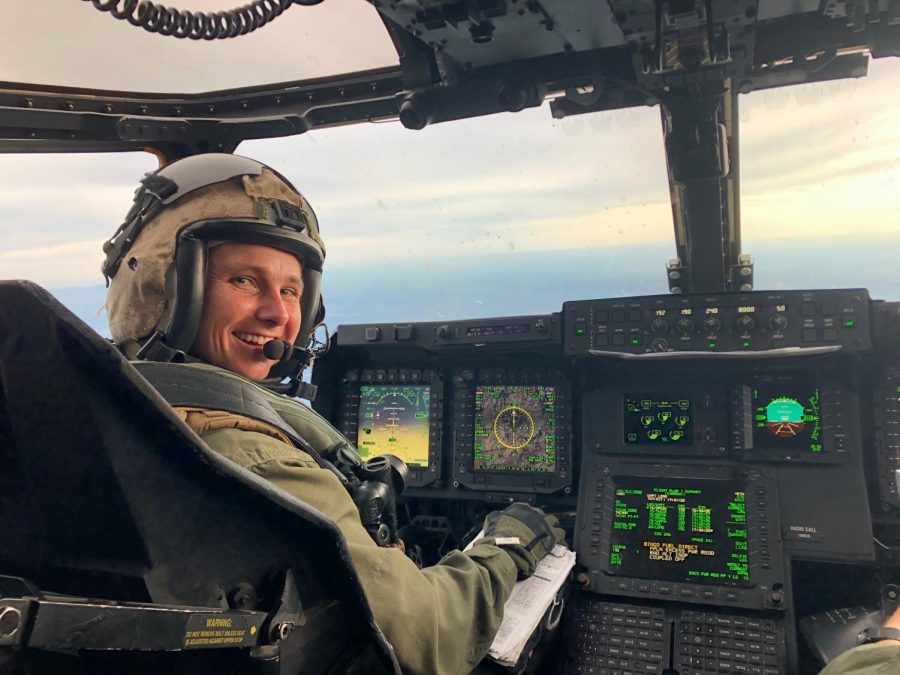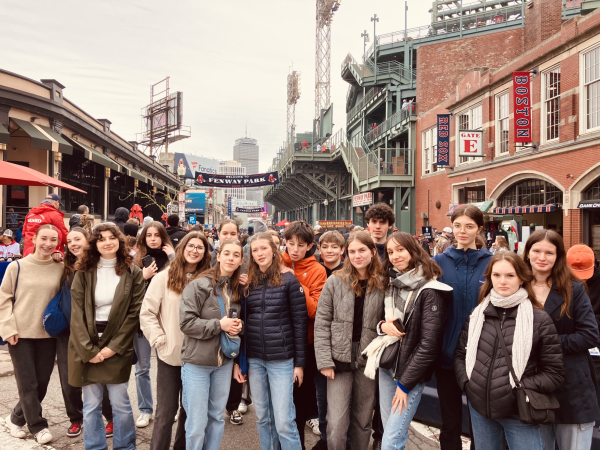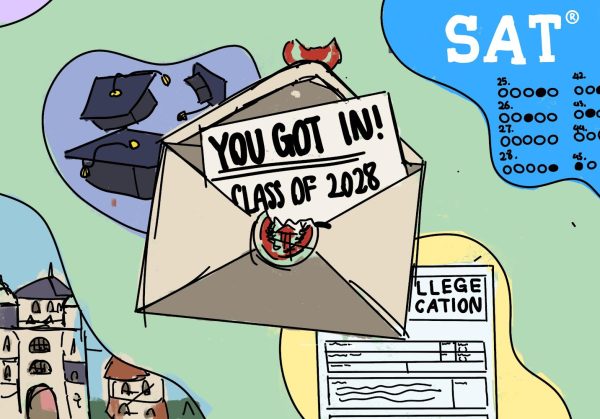Alumnus of the Issue: Ginger Cutler ’07
Groton has a lengthy list of alumni with impressive and interesting careers. Ginger Cutler, form of ’07, fits right into this group. However, her path was a little different. Instead of showing up from nine to five daily to sit at a desk, Ginger cruises thousands of feet in the air expertly flying Osprey planes for the Marines and teaching others to do the same. Her career has spanned thousands of miles and multiple continents. She moved through Georgetown, became a second lieutenant, and has since served as an Osprey helicopter pilot, instructor pilot, and aircraft commander. Some of her accomplishments in these years of flying include being chosen by President Trump for a special last minute flight mission to Singapore and being deployed as the air officer of a crisis response task force.
The road to this career was long and not easy by any stretch. Ginger’s journey started many years ago when she was attending Georgetown. Ginger took a semester off to work at a boarding school in India. This experience opened her eyes to her desires for the future. As she describes it, “I wanted to have an adventure after college. I didn’t just want to make a lot of money. That seemed kind of boring. I had to do something a little more meaningful and something a little more exciting.”
Having grown up in a house on the water, the Navy appealed to her. After stumbling into a Marine Corps recruiter at a job fair, however, she was persuaded to submit an application and see what might happen. Once they discovered her perfect 20/20 vision, they suggested she apply to become a pilot, which appealed to Ginger as the ultimate adventurous career. She applied to and received an air contract, and before she knew it, she was at Officer Candidate school, which she describes as “the officer version of boot camp.” To become an officer, in addition to having gone to college, she also had to attend the ten-week grueling camp.
After graduating, she attained the title of second lieutenant, and proceeded to Virginia, where she received 6 months of training in infantry leadership skills, and finished off her education at flight school. During these three years, Ginger met her first real roadblock. She felt like she didn’t belong, as the material was difficult, and flying proved a challenge for her. “I was presented with lots of technical, science-based engineering knowledge that I had to learn,” she said. “None of it made sense to me, as I was always a humanities person.”
Though flight school is world’s away from the tidy classrooms of our schoolhouse, Ginger’s Groton experience along with her dedication helped her to fight through. “At Groton, you are getting such a phenomenal educational experience. You will forever know how to study and know how to do well in school,” she said. Using these skills she gleaned from her high school education, she says “I was able to succeed academically because . . . I knew how to do well in terms of mastering academic type material. I was able to distinguish myself by my knowledge of the aircraft and of emergency procedures.”
Ginger often had to fight to get to where she is today. When Ginger was just 25, she was flying Ospreys for the Marines as one of only two females of the 25 Osprey pilots. While one may think this would warrant pride and accomplishment, Ginger felt the opposite – “like a second former on the varsity football team,” as she puts it. Instead of giving up, Ginger pressed on, persevering through a difficult process until she eventually found herself holding her own in the group of Osprey pilots. After three years, she became an instructor pilot and an aircraft commander.
In the time since, Ginger has been trusted with various complex missions. In December 2017, President Trump moved the US embassy in Israel from Tel Aviv to Jerusalem, inflaming tensions throughout the world through the apparent favoritism of Israel over Palestine. Worried about riots and widespread anti-American sentiment, the US decided to position military members in countries where uprising among the Muslim world was possible. Ginger was told that she had to move from Japan to Singapore, one of those flagged areas of possible unrest. To get to Singapore, Ginger would have to execute an eight-hour flight over the ocean in an Osprey full of military Marines, a maneuver that would put the whole crew and passengers at risk. Flying over the open ocean incurs lots of risk. If there was an issue with the aircraft, Ginger would have to intentionally ditch the aircraft in the ocean in an attempt to save the passengers. The thought of possibly needing to make this decision was initially daunting to Ginger, and the short preparation time incurred enormous levels of stress.
In preparation for the challenging 1500 mile journey, Ginger reviewed and relied on standard operating procedures, no matter how small or seemingly insignificant. From the necessary size of a place to land to the weather requirements necessary for takeoff, Ginger studied them all, as she knew they could ultimately mean the difference between life or death. Luckily, just hours before the takeoff, the journey was called off, a big relief to Ginger and all the passengers.
Furthermore, Ginger hasn’t been spared the disruptions of the pandemic. Last year, Ginger deployed as the air officer of a crisis response task force. She visited Portugal, France, and many parts of Spain working with the Marine Corps, Army, and Navy to plan exercises to strengthen military relations between the US and NATO militaries. After a busy six months, Ginger was anxious to return to the US. However, Covid-19 lockdowns put a stop to all air travel less than a week before her scheduled departure. The delay stretched on for six weeks, a time Ginger describes as particularly difficult.
“It sucked, because I couldn’t plan bilateral exercises or accomplish interesting training with NATO partner militaries because nobody could go anywhere. That’s a painful six weeks when you’ve already been gone 6 months,” she said. During that trying time, when Ginger once again faced real world issues, she drew on her experience at Groton. Looking back, she notes that the boarding school environment forced her to learn how to self soothe from an early age. “You really have to be able to absorb a terrible day and work through it mentally on your own. You learn to soothe yourself when you are overwhelmed with anxiety or sadness or frustration.” In March, during the period of high emotions and stress in the pandemic, Ginger had to plaster on a smile and internally cope to get herself through.
Ginger’s story brings hope: hope to the United States to know that people as strong and dedicated as Ginger are protecting our country, and hope to the students of Groton that our years here will provide us not only with an education and connections, but with so much more. Groton’s campus may be a world away from an Osprey over the open ocean, but Ginger shows how strong the connection to the circle can remain.






